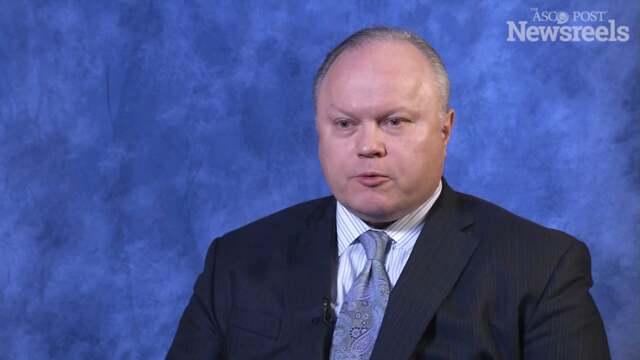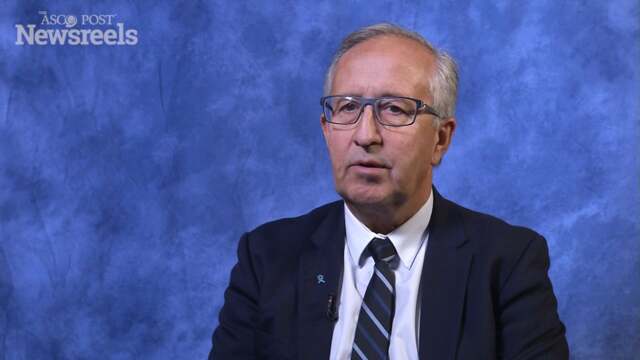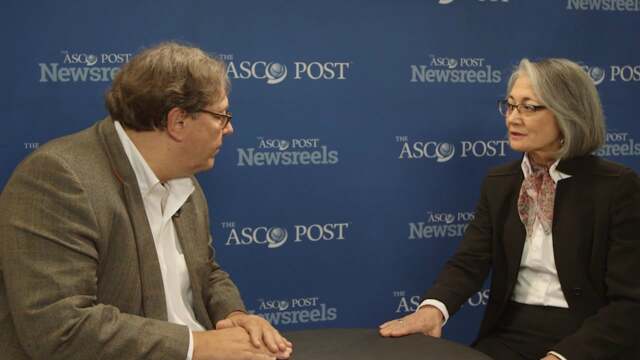ASTRO 2016: Intermediate-Risk Prostate Cancer May Be Well Controlled With Brachytherapy Alone
For men with intermediate-risk prostate cancer, radiation treatment with brachytherapy alone can result in similar cancer control with fewer long-term side effects, when compared to more aggressive treatment that combines brachytherapy with external beam therapy (EBT), according to research...
Patient-Reported Outcomes After Active Monitoring, Surgery, or Radiotherapy in PSA-Detected Localized Prostate Cancer
Patient-reported outcomes differed among men with localized prostate cancer detected by prostate-specific antigen (PSA) testing who were randomized to receive active monitoring, surgery, or radiotherapy in the UK ProtecT trial, according to a report by Donovan et al in The New England Journal of...
ASTRO 2016: Hypofractionated Radiation Therapy Can Reduce Treatment Time With Comparable Quality of Life for Patients With Prostate Cancer
For men with early stage, low-risk prostate cancer, treatment with hypofractionated radiation therapy offers comparable health-related quality of life outcomes in one-third less treatment time than conventional radiation therapy, according to research presented by Watkins Bruner et al at the 58th...
Bradley R. Prestidge, MD, on Prostate Cancer: Initial Findings of NRG Oncology/RTOG 0232
Bradley R. Prestidge, MD, of Bon Secours VA Health System, summarizes his plenary lecture on this phase III trial comparing combined external beam radiation and transperineal interstitial permanent brachytherapy with brachytherapy alone for selected patients with intermediate-risk prostate cancer. (Plenary Lecture 1, Presentation 7)
Alan Pollack, MD, PhD, on Prostate Cancer: Postprostatectomy Radiotherapy
Alan Pollack, MD, PhD, of the University of Miami Health System, summarizes a session that included discussion of outcomes, dose response, oligometastatic disease, and gene predictor of response. (Presentations 228-235)
Anders Widmark, MD, PhD, on Intermediate-Risk Prostate Cancer: Results From the HYPO-RT-PC Trial
Anders Widmark, MD, PhD, of the Umea University Hospital Oncology, discusses the early toxicity results from the phase III Scandinavian study on extreme hypofractionation vs conventionally fractionated radiotherapy for intermediate-risk prostate cancer. (Abstract LBA-5)
Daniel Hamstra, MD, PhD, on Prostate Cancer: Decreasing Rectal Toxicity
Daniel A. Hamstra, MD, PhD, of Texas Oncology, discusses phase III findings on the use of an absorbable hydrogel spacer designed to decrease rectal toxicity and improve bowel quality of life for patients with prostate cancer. (Abstract LBA-6)
Blood Biomarkers in Abiraterone- or Enzalutamide-Resistant Prostate Cancer Tumor Cells
While searching for a noninvasive way to detect prostate cancer cells circulating in blood, Duke Cancer Institute researchers have identified some blood markers associated with tumor resistance to two common hormone therapies. In a study published by Gupta et al in Clinical Cancer Research, a team...
Large Study Finds No Link Between Vasectomy and Prostate Cancer Risk
In a new study, men who underwent vasectomy did not have an increased risk of prostate cancer, nor were they more likely to die from prostate cancer than men who did not receive this procedure. According to the researchers, this is the largest prospective study of vasectomy and fatal prostate...
Testosterone-Related Genetic Mutation Associated With Poorer Survival in Prostate Cancer
A collaborative Cleveland Clinic–Mayo Clinic team of researchers has shown for the first time that patients with advanced prostate cancer are more likely to die earlier of their disease if they carry a specific testosterone-related genetic abnormality. The findings, published by Hearn et al in The...
Continuation of Docetaxel May Improve Survival in Metastatic Castration-Resistant Prostate Cancer
The number of docetaxel cycles completed was associated with improved overall survival among men with metastatic castration-resistant prostate cancer receiving docetaxel, prednisone, and lenalidomide (Revlimid) or docetaxel/prednisone, in the phase III Mainsail trial. de Morrée et al reported this ...
Decline in Circulating Tumor Cell Count and Treatment Outcome in Advanced Prostate Cancer
A drop in the number of cancer cells detected in a patient’s blood could be the best indicator yet as to whether treatment for prostate cancer is working. A new study, published by Lorente et al in European Urology, shows that a 30% decline in a patient’s numbers of circulating tumor...
Similar 10-Year Survival Reported With Active Monitoring, Surgery, or Radiotherapy for PSA-Detected Localized Prostate Cancer
In a UK trial (ProtecT) reported in The New England Journal of Medicine, Hamdy et al found no significant differences in prostate cancer–specific or overall mortality among men with localized prostate cancer detected by prostate-specific antigen (PSA) testing who underwent active monitoring,...
PSA Failure Seems to Be Linked to Poorer Survival in Men With Unfavorable-Risk Prostate Cancer and No/Minimal Comorbidity
In an analysis of a clinical trial population reported in the Journal of Clinical Oncology, Giacalone et al found that prostate-specific antigen (PSA) failure was associated with an increased risk of mortality among men with unfavorable-risk prostate cancer who had no or minimal comorbidity burden. ...
Multitude of Mentors Help Shape an Illustrious Career in Oncology
Sumanta K. Pal, MD, has had a longer career in oncology than many other colleagues his age. Perhaps the reason for that may center on his starting college at the age 13 and medical school at the age of 17. Today this internationally recognized leader in genitourinary cancers is Assistant Professor ...
Continuation of Docetaxel May Improve Survival in Metastatic Castration-Resistant Prostate Cancer
The number of docetaxel cycles completed was associated with improved overall survival among men with metastatic castration-resistant prostate cancer receiving docetaxel, prednisone, and lenalidomide (Revlimid; DPL) or docetaxel/prednisone (DP), in the phase III Mainsail trial. de Morrée et...
Hypofractionated Radiotherapy for Localized Prostate Cancer: A New Standard of Care?
For at least the past quarter of a century, radiobiologists and radiation oncologists have debated the role of hypofractionation (fewer total fractions with a higher dose per fraction) for prostate cancer. The debate stems from the unique radiobiology of prostate cancer and the best means to...
Early-Stage Prostate Cancer Incidence Rates Decline, Distant-Stage Disease Rates Unchanged in 2013
Jemal et al described findings indicating a continued decline in the incidence of localized/regional-stage prostate cancer at 2 years after the U.S. Preventive Services Task Force recommendation against routine prostate-specific antigen (PSA) screening in men aged ≥ 50 years in 2011, in a letter ...
European Studies Compare Conventional vs Hypofractionated Radiotherapy for Localized Prostate Cancer
Two recent European phase III trials with different study designs focused on hypofractionated vs conventional radiotherapy in localized prostate cancer. Investigators in the CHHiP trial1 showed that the hypofractionated approach is noninferior to standard fractionation, with no increase in side...
HSD3B1 Allele May Be Associated With Resistance to Androgen-Deprivation Therapy and Poorer Outcome in Prostate Cancer
In a retrospective multicohort study reported in The Lancet Oncology, Hearn et al found that the inherited HSD3B1 (1245C) allele was significantly associated with resistance to androgen-deprivation therapy and poorer outcome in men with prostate cancer. HSD3B1 (1245A>C) has been linked to...
PSA-Based Computational Model Predicts Time to Relapse After Prostate Cancer Surgery
Approximately one in four patients who undergo radical prostatectomy experience a cancer recurrence. Now a study by Stura et al investigating a prostate-specific antigen (PSA)-based computational model that uses four consecutive postsurgical PSA values has found the mathematical model to be highly...
Novel MRI Technique Distinguishes Healthy Prostate Tissue From Cancer Using Zinc
A novel magnetic resonance imaging (MRI) method that detects low levels of zinc ion can help distinguish healthy prostate tissue from cancer, The University of Texas (UT) Southwestern Medical Center radiologists have determined. The findings were published by Clavijo Jordan et al in the Proceedings ...
Hypofractionated Radiotherapy: Balancing Benefits vs Risks in Men With Localized Prostate Cancer
Radiation for prostate cancer typically requires 40 to 45 daily treatments, given over 8 to 9 weeks. Long fractionation schemes are chosen for most cancers, because they allow for tumor killing while reducing the potential for injury to normal tissue. However, the radiobiology of prostate cancer...
Hypofractionated Radiotherapy Not Inferior to Conventional Radiotherapy in Low-Risk Prostate Cancer
In a phase III noninferiority trial (NRG Oncology RTOG 0415) reported in the Journal of Clinical Oncology, W. Robert Lee, MD, MS, Med, of Duke University Medical Center, and colleagues found that hypofractionated radiotherapy was not inferior to conventional radiotherapy in disease-free survival...
Combining Radium-223 With Other Therapies May Be of Benefit in Metastatic Castration-Resistant Prostate Cancer
In an international, single-arm phase IIIB trial reported in The Lancet Oncology, Saad et al found benefit with the addition of abiraterone (Zytiga) or enzalutamide (Xtandi) to radium-223 (Xofigo) in patients with metastatic castration-resistant prostate cancer. This early-access program was...
Similar Functional Outcomes Reported With Robot-Assisted Laparoscopic and Open Radical Retropubic Prostatectomy
Robot-assisted laparoscopic prostatectomy and open radical retropubic prostatectomy yielded similar domain-specific quality-of-life or pathologic outcomes at 12 weeks in men with newly diagnosed, clinically localized prostate cancer, according to the results of a randomized phase III trial reported ...
Higher Exposure to Radical Local Treatment Linked to Lower Mortality in Men With Very High-Risk Prostate Cancer
Men with very high-risk prostate cancer treated at hospitals with a high proportion of administered radical local treatment (radiotherapy or prostatectomy) have half of the mortality risk of men who are treated at hospitals with the lowest proportions, according to a new study conducted by...
Hypofractionated Radiotherapy Not Inferior to Conventional Radiotherapy in Low-Risk Prostate Cancer
In a phase III noninferiority trial (NRG Oncology RTOG 0415) reported by Lee et al in the Journal of Clinical Oncology, W. Robert Lee, MD, MS, Med, of Duke University Medical Center, and colleagues found that hypofractionated radiotherapy was not inferior to conventional hypofractionated...
Androgen-Deprivation Therapy May Increase Mortality in African American Men With Favorable-Risk Prostate Cancer
In a retrospective study analyzing patients' medical records, researchers at Brigham and Women's Hospital (BWH) found that race significantly affected longevity by increasing the likelihood of death after receiving androgen-deprivation therapy. These findings were published by Kovtun et al in...
Hypofractionation May Be Poised to Become New Standard of Care for Prostate Cancer
There has been an ongoing debate about which type of radiation therapy is preferable in the treatment of localized prostate cancer: hypofractionation (larger fractions given over 4–5 weeks) or conventional radiotherapy (given over 8–9 weeks). A new study presented at the 2016 ASCO Annual Meeting...
Sociodemographic and Clinical Predictors of Switching to Active Treatment From Observational Management in Low-Risk Prostate Cancer
Although active surveillance for patients with low-risk prostate cancer has become an increasingly acceptable strategy for disease management, many men opt for definitive therapies such as radical prostatectomy or radiation therapy. A new study of more than 2,200 patients with low-risk prostate...
Patients With Low-Risk Prostate Cancer on Active Surveillance Experience Good Quality of Life
Active surveillance has become an increasingly important alternative to surgery, chemotherapy, or radiation treatment for men diagnosed with low-risk prostate cancer. However, what is the impact of active surveillance on health-related quality of life in patients selected or opting for this...
No Survival Benefit for Cabozantinib Reported in Previously Treated Metastatic Castration-Resistant Prostate Cancer
Smith et al found no improvement in overall survival with cabozantinib (Cometriq) vs prednisone in patients with previously treated metastatic castration-resistant prostate cancer, in the phase III COMET-1 trial reported in the Journal of Clinical Oncology. Cabozantinib, which inhibits MET, VEGF...
Early Evidence of Anti–PD-1 Activity in Enzalutamide-Resistant Prostate Cancer
Restoring tumor-specific immunity is a treatment strategy that works well in melanoma and lung cancer patients. Now a new study out of the Oregon Health & Science University (OSHU) Knight Cancer Institute is reviving hope that the approach also may help men with life-threatening prostate...
PET/MRI: A One-Stop Imaging Test to Detect Prostate Cancer?
A University of Michigan study published by Piert et al in The Journal of Nuclear Medicine reported that the addition of molecular imaging based on F-18-choline positron-emission tomography (PET) improves the identification of significant prostate cancer over multiparametric prostate magnetic...
Study Finds Incidence of Mutations in DNA-Repair Genes Significantly Higher in Men With Metastatic Prostate Cancer
The incidence of mutations in DNA-repair genes was significantly higher among men with metastatic prostate cancer than among men with localized disease (11.8% vs 4.6%), according to a study by Pritchard et al reported in The New England Journal of Medicine. In addition, the frequency ...
Mixed Results With Hypofractionated vs Conventional Radiotherapy for Localized Prostate Cancer
Investigators of two European phase III trials have reached different conclusions on whether hypofractionated radiotherapy should replace conventional radiotherapy as a new standard of treatment in localized prostate cancer. The CHHiP trial findings favoring hypofractionation were reported by David ...
Novel Approach to PET/CT Imaging May Predict Location and Extent of Primary Prostate Cancer
With surgical removal at the front line of defense against prostate cancer, oncologists are considering prostate-specific molecular imaging at the point of initial biopsy and preoperative planning to root out the full extent of disease, researchers showed at the 2016 Annual Meeting of the Society...
Improved Survival Reported With Prostate Radiation Therapy Plus Androgen-Deprivation Therapy in Metastatic Prostate Cancer
The addition of prostate external-beam radiation therapy to androgen-deprivation therapy was associated with prolonged overall survival in men with newly diagnosed metastatic prostate cancer, according to a National Cancer Database analysis reported by Rusthoven et al in the Journal of Clinical...
Tasquinimod Improves Radiographic PFS but Not OS in Metastatic Castration-Resistant Prostate Cancer
In a phase III trial reported in the Journal of Clinical Oncology, Sternberg et al found that tasquinimod, an oral therapy targeting components of the tumor microenvironment, increased radiographic progression-free survival but not overall survival vs placebo in men with chemotherapy-naive...
SNMMI 2016: PET/CT Imaging of Prostate Cancer With Specific Agent May Be an Accurate Prebiopsy/Preoperative Guide
With surgical removal at the frontline of defense against prostate cancer, oncologists are considering prostate-specific molecular imaging at the point of initial biopsy and preoperative planning to root out the full extent of disease, researchers showed at the 2016 Annual Meeting of the Society of ...
FDA Approves New Diagnostic Imaging Agent to Detect Recurrent Prostate Cancer
On May 27, the U.S. Food and Drug Administration (FDA) approved fluciclovine F-18 (Axumin), a radioactive diagnostic agent for injection. Fluciclovine F-18 is indicated for positron-emission tomography (PET) imaging in men with suspected prostate cancer recurrence based on elevated...
Increased Survival and Toxicity With Docetaxel, No Benefit of Zoledronic Acid, When Added to First-Line Hormone Therapy in Prostate Cancer
As reported in The Lancet by Nicholas D. James, BSc, MBBS, PhD, of the University of Warwick, and colleagues, survival results of the STAMPEDE trial, which used a multiarm, multistage seamless phase II/III design, provide little evidence of benefit of zoledronic acid and showed increased survival ...
Prostate Cancer: Opinions Vary on Gleason Scores and Surgery
Diagnosis and treatment of prostate cancer have been the source of heated debate for decades, most of which has centered on the clinical value of the prostate-specific antigen (PSA) test. In 2012, the U.S Preventive Services Task Force (USPSTF) gave the PSA test a D grade, which discourages many...
Toni K. Choueiri, MD, and Paul L. Nguyen, MD, on Prostate Cancer: Expert Perspectives on Four Studies
Toni K. Choueiri, MD, and Paul L. Nguyen, MD, both of the Dana-Farber Cancer Institute, discuss four key studies on high- and intermediate-risk prostate cancer, as well as localized disease (Abstracts 5001, 5003, 5023, and 5021).
Chemotherapy After Radical Prostatectomy May Benefit African Americans and High-Risk Patients
A new U.S. Department of Veterans Affairs (VA) study suggests that African American men and men with a higher tumor stage may benefit from adjuvant chemotherapy following radical prostatectomy.1 According to prespecified analysis of these two “high–risk” subgroups, patients with ≥ T3b disease had a ...
Celestia S. Higano, MD, and Chris Parker, MD, on the PROMIS Study of Elevated PSA
Celestia S. Higano, MD, of the University of Washington, and Chris Parker, MD, of the Royal Marsden Hospital, discuss findings from this confirmatory study evaluating the accuracy of MRI and TRUS biopsy in men with an elevated PSA (Abstract 5000).
A. Oliver Sartor, MD, and Celestia S. Higano, MD, on Findings of the FIRSTANA Trial in Prostate Cancer
A. Oliver Sartor, MD, of Tulane University, and Celestia S. Higano, MD, of the University of Washington, discuss findings from this phase III study on cabazitaxel vs docetaxel in chemotherapy-naive patients with metastatic castration-resistant prostate cancer (Abstract 5006).
FDA Approves New Diagnostic Imaging Agent to Detect Recurrent Prostate Cancer
On May 27, the U.S. Food and Drug Administration (FDA) approved fluciclovine F-18 (Axumin), a radioactive diagnostic agent for injection. Fluciclovine F-18 is indicated for positron-emission tomography (PET) imaging in men with suspected prostate cancer recurrence based on elevated...
Significant Increased Risk of Noncancer Hospitalization Following Diagnosis of Prostate Cancer in the Elderly
Elderly men had a significant increase in the risk of noncancer hospitalizations following the diagnosis of prostate cancer, according to a population-based retrospective cohort study conducted by Amit D. Raval, PhD, and colleagues at West Virginia University, Morgantown. Results were published in...







